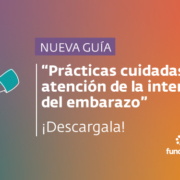In a live Instagram, we play and reflect together with Activating Rights on issues related to Comprehensive Sexual Education, such as gender stereotypes, micro-chauvinism, relationships, ties, consent, among others.
“Below, we offer a google translate version of the original article in Spanish. This translation may not be accurate but serves as a general presentation of the article. For more accurate information, please switch to the Spanish version of the website. In addition, feel free to directly contact in English the person mentioned at the bottom of this article with regards to this topic”.
Last Thursday, September 10, we carried out an activity on Instagram together with the “Activating rights” team for Sexual and (non) Reproductive Rights, in order to learn about their activities and share different experiences on the implementation of Law 26,150 on Education Integral Sexual in educational institutions, in a fun and psychopedagogical way.
From the current context generated by the pandemic, new ways of teaching-learning are proposed through virtuality. These new ways challenge not only teachers and students, but also families. It is at this new juncture that ESI is problematized and thought as part of the curriculum and as essential as the right of children and adolescents. However, its implementation today continues to be hampered within many institutions.
“Chomaso that they speak for you”
The meeting took place on InstagramLive and was carried out with a game -tutti frutti- based on topics of interest that emerged from a survey that we had distributed among young people. The categories we played with were: insults based on sexual orientation or gender identity; forms or types of sex-affective relationships; strategies to reject someone who insists on looking for you; things that should not happen in a sex-affective bond and LGBTTTIQ + cultural consumption. These sections gave rise to the conversation among those who broadcast the live, who while receiving the responses from the public developed a brief analysis of each proposed word.
After going through several letters, from Activating Rights they shared some reflections on their work and the experiences within the workshops that they carry out in schools together with children and adolescents. The team works with young people in different educational institutions from a rights perspective and with a gender perspective, generating collective and non-adultcentric spaces, where they can express what they think and feel, developing in an environment of informality and trust.
The importance of articulating
These learning and exchange spaces are enriching and collaborate with the promotion and implementation of a fundamental right for young people, giving place to the protagonists to appropriate them and be an active component of their own learning.


